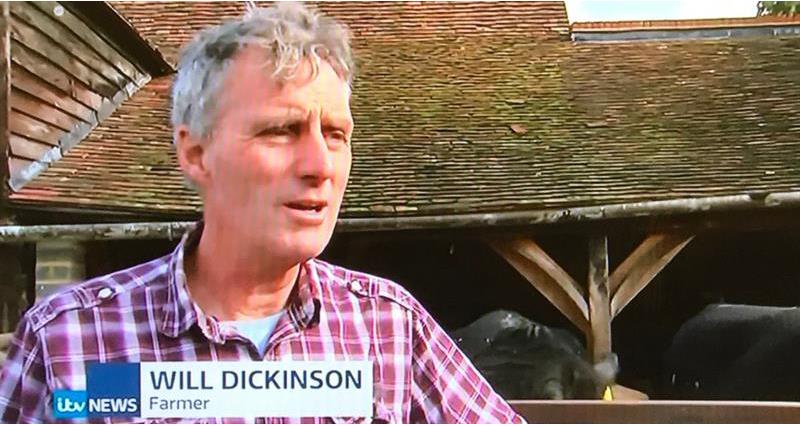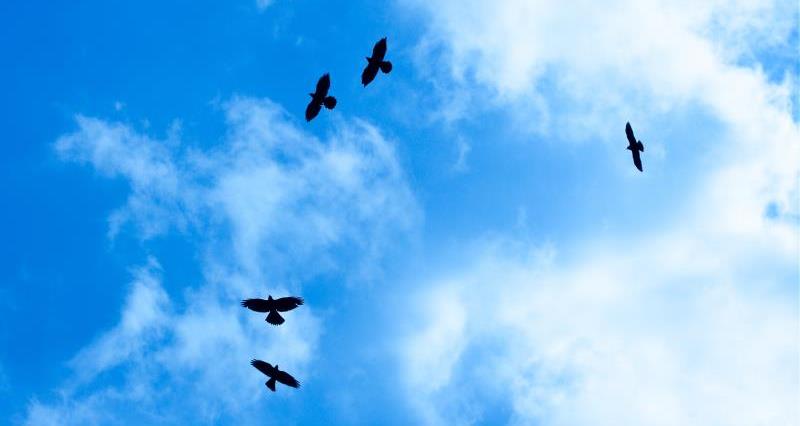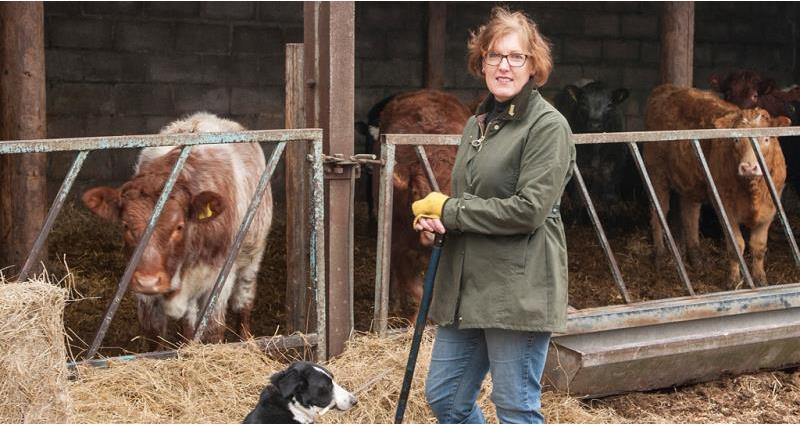Further licences allow control for conservation purposes or for public health or safety.
Defra continually assesses any evidence that the licences may need modification before the expiry date, and endeavours to ensure licence users have enough time to adjust to any operational changes that may be required.
What are general licences?
A general licence can be used for activities that carry a low risk to the conservation or welfare of a protected species. There are a series of these licences, and those relevant to farm businesses include licences for control of pest birds and stoats, and also for release of gamebirds close to protected sites.
In 2020, NE (Natural England) set out changes to licences for the lethal control of herring gulls and lesser black-backed gulls in England to protect these declining species. Anyone wanting to control gull species must apply for an individual licence.
Issuing of licences in the UK
General licences for pest bird control in England are currently issued by Defra. There are differences in Wales, Scotland, and Northern Ireland.
There is no need to apply for general licences, but anyone controlling pest bird species under general licences in England is required by law to abide by the terms and conditions of the licence. There are no changes to the conditions of the licences from last year.
GL42
The main licence relevant to farming is GL42: ‘the general licence to kill or take certain species of wild birds to prevent serious damage’. The government extended the period of the licences to two years, and they are valid from 1 January 2022 to 31 December 2023.
GL42 allows an authorised person (the owner or occupier of the land, or any person authorised by them) to kill the wild bird or damage or destroy nests or eggs for the purposes of preventing serious damage.
The general licences require that ‘reasonable endeavours must continue to be made to achieve the purpose in question using lawful methods’ (ie, wherever possible non-lethal methods of control should be attempted). Defra advises users to keep a record of problems and the use of other lawful methods.
The general licence clearly defines the birds that can be controlled for certain purposes. Under GL42 these are:
- Direct attacks on livestock: carrion crow, jackdaw, magpie, rook.
- Serious damage to livestock foodstuffs: carrion crow, feral pigeon, jackdaw, rook, wood pigeon.
- Serious damage to crops, fruit and vegetables: Canada goose, carrion crow, Egyptian goose, feral pigeon, jackdaw, Indian house crow, monk parakeet, ring-necked parakeet, rook, wood pigeon.
Methods that can be used under this licence include destroying eggs and nests, shooting with a firearm or using a cage trap (for the latter you must comply with GL33 ‘Trapping wild birds: standard licence conditions’).
In Wales, the equivalent licence is GL01. In Wales, the licence can also be used to prevent the spread of disease to livestock or livestock feeding stuffs.
Protected sites
As with the previous system, users will need to ensure they have the appropriate consent from Natural England for activities that may cause damage to protected features on Sites of Special Scientific Interest.
Where species can no longer be controlled under the general licence for certain purposes, you will need an individual licence from Natural England.
These species have been removed because of lack of evidence of widespread need and so an individual licence application will require specific evidence of need, proportionality and whether alternatives have been considered.
As well as GL42, there are two other general licences: GL40 ‘licence to kill or take for conservation purposes’ and GL41 ‘licence to kill or take for public health or safety’.
The three new general licences are:
- WML GL40: general licence to kill or take certain species of wild birds to conserve endangered wild birds and flora or fauna. Species covered:
- carrion crow
- jay
- magpie
- Canada goose
- Egyptian goose
- monk parakeet
- ring-necked parakeet
- sacred ibis
- Indian house-crow
- WML GL41: general licence to kill or take certain species of wild birds to preserve public health or public safety. Species covered:
- jackdaw
- feral pigeon
- Canada goose
- monk parakeet
- WML GL42: general licence to kill or take certain species of wild birds to prevent serious damage and prevent the spread of disease. Species covered:
- carrion crow
- jackdaw
- magpie
- feral pigeon
- rook
- woodpigeon
- Canada Goose
- monk parakeet
- ring-necked parakeet
- Egyptian goose
- Indian House crow
To comply with conditions of the licence, you must follow the standard licence conditions in WML-GL33. GL33 also provides advice on trapping and the use of decoy birds.
GL43 and GL45: General licences for gamebird release
Due to increasing HPAI (highly pathogenic avian influenza) levels across Great Britain, Defra continually monitors these licences, and they could be amended at any time.
The general licence (GL43: Gamebirds: licence to release common pheasants or red-legged partridges on European sites and within 500m of their boundary) runs for two years and will expire in February 2027.
GL43 states that:
- You must not release common pheasants or red-legged partridges into the wild on European sites or within 500 metres of their boundary (known as the buffer zone), except under a licence.
- GL43 allows an authorised person to release into the wild a specified number of common pheasants or red-legged partridges on European sites designated as special areas of conservation (SACs), or within 500m of the boundary of those sites.
- GL43 does not allow release on other European sites or within 500m of the boundary of those sites.
A new general licence (GL45: licence to release common pheasants or red-legged partridges on Special Protection Areas or within 500 metres of their boundary) was issued in March 2024 and expired on 1 February 2025.
Ministers have not approved for GL45 to be re-issued as it is currently not possible to rule out the risk of HPAI (which remains very high) spreading to the internationally protected birds present on SPAs (Special Protection Areas).
Shoots will be able to apply for an individual licence for the release of gamebirds on SPAs from Natural England.
The NFU recommends reading the government guidance on GL43 and GL45 carefully if you plan to release gamebirds.
An individual licence may be required when unable to comply with the conditions of the licence. If the site is an SSSI then consent is required before birds can be released.
Control of gull species
Due to their poor conservation status, herring gulls and lesser black-backed gulls are not included in GLs. The breeding population of herring gull has fallen by 60% in recent decades, with lesser black-backed gulls declining by an estimated 48%.
NE will license gull control through individual licences. An individual licence application should be submitted in February and March in preparation for the bird breeding season.
Further guidance can be found at: GOV.UK | Wild birds: licence to kill, take or disturb (A08)
Control of stoats
Natural England introduced a new general licence for control of stoat on 1 April 2020. It is no longer lawful to use certain types of traps and stoats may only be caught in spring traps or live traps listed in the new general licence.
The licence to trap stoats to prevent serious damage to livestock (GL39) can only be used to prevent serious damage to the following types of livestock when they are vulnerable to stoat predation:
- domestic poultry and waterfowl,
- gamebirds and wildfowl while they are held captive within a fenced pen, and
- rabbits farmed for the provision of food.
The licence to trap stoats to conserve wild birds (GL38) is available at: GOV.UK | licence to trap them to conserve wild birds (GL38).
Defra has produced more guidance about the licences.
What has the NFU been doing?
On 25 April 2019, following a legal challenge by Wild Justice, Natural England revoked three general licences which enabled users to kill or take certain species of wild birds. Following that there were a series of consultations and draft licences, and responsibility for this passed to Defra.
During this period, the NFU engaged with Defra and NE to ensure new GLs were fit for farming. The NFU submitted a comprehensive response to Defra’s Call for Evidence on 14 May 2019.
In December 2019, the NFU submitted evidence to Defra's consultation on the future of GLs. The NFU's evidence was submitted from hundreds of farmers, calling for the new regime to be fit for purpose, more transparent and accessible for farmers. The NFU's evidence told how the current system prevents damage to crops costing thousands of pounds, and horrific attacks by crows on livestock, particularly lambs.
The NFU recommended that the new licencing system should be designed in line with five key principles:
- Straightforward:
It is vital that general licences are sufficiently certain, clear, and unambiguous given that non-compliance may lead to a criminal prosecution. - Practical:
Licences must be designed to work practically on the ground and pragmatically with a farm business. - Transferable:
Licences must be able to be used effectively by landowner, land manager, tenant or pest controller. NFU members continue to report that the authorisation required is not sufficiently clear. - Evidence:
There must be clarity on the record keeping requirements for farmers to demonstrate serious damage and of the non-lethal methods being used. - Species:
Each general licence should allow control of a range of species to prevent serious damage or disease. A species-by-species approach can be very difficult to implement on the ground.
Why is this issue so important?
NFU members explain the challenges and impacts:
Angela Sargent, Derbyshire
NFU member Angela Sargent grows corn and keeps livestock on her mixed farm in Derbyshire.
"It’s about balance. We are in HLS and ELS and grow wild bird seed so the conservation aspect of the farm is very important, but bird control must go hand in hand with this.
“Birds have devastated some of the crops but lambing has been the main problem. We had a sick ewe, who was unable to stand, so to avoid any trauma we decided it was better to treat the ewe in the field. After treatment, I returned to find the ewe alive, but the eyes had been pecked out. This is what you’re up against.
“It's important for us as farmers to keep bird licences, among other issues, high on politicians’ agendas at the moment.”
Graham McLeod, North Devon
NFU member Graham McLeod runs 600 lambing ewes on the edge of Exmoor. He knows only too well the damage that can be done by members of the crow family.
He said: “I normally lamb the ewe hoggs outside and I have to be there at daybreak. If I’m not and I’ve got lambs being born they will be attacked. Tongues get taken and a couple of times if a ewe is struggling we’ve had lambs killed before they’re even born.
“Crows and magpies will take the cords from the lambs’ navels and disembowel them, pulling organs out while they are living. Pulling guts out through the back passage is another favourite spot for them.
“Without proper access to controls we would lose at least 5% of our lambs in pretty horrific circumstances, easily.
“I responded to the Defra survey back in May and I’ve just responded to the new one as well. Farmers need to get their act together and do the survey.
“There’s a real danger that without proper licences farmers will be made criminals. It’s a no-brainer; they are not going to stand around and let these things kill baby lambs. That’s how important this is. I generally only shoot crows at lambing time and I know they’ve got to survive, but too many can have a massive impact. It’s a necessity.
“And don’t forget this is about wildlife too. I’ve seen pairs of carrion crows where one will harry a mother duck and the other will take the ducklings one by one, taking the whole brood within a day. Magpies are up and down the hedges taking song birds including migrants, mostly their chicks and eggs. It’s what they live on. Then you get people saying wildlife decline is because of ‘farming practices’. I’m sorry, but it just isn’t.
“The public needs to know what damage is being done to farm animals and to wildlife and why proper general licences are so important.”
Will Dickinson, Hertfordshire
NFU Council member Will Dickinson has a good relationship with his MP and has discussed the importance of general licences to his business on multiple occasions. However, he thinks it’s still important to contribute to the new consultation, and is encouraging fellow farmers to do the same.
In the Hertfordshire countryside, pigeons are a perennial problem that affects his crop and the animals he cares for on his 800 hectare farm. The use of general licences is important to his contracting business, which he works in partnership with a neighbour. They manage arable, sheep and cattle, as well as 200 horses on livery, on land that goes up to houses in the local village, so shotguns must be used carefully.

He said: “Half of our land is protected woodland, and the field size is 10-12 acres with hedgerows around them. There’s a lot of places where a lot of pigeons can roost.
"We’ve had noise abatement notices before now, and with the liveries we can’t just leave bangers in a field as they might go off when people are going past with horses.
“We have some lads who go pigeon shooting and when they do go they can see people on the horse so they know to stop. Our only defence is to hope it rains right after we’ve drilled [the crop], and hopefully during the winter, snow protects it.”
“I keep animals because I love them and like looking after them, but one had its eyes pecked out and worse, but was still alive.”

